View in other NatureServe Network Field Guides
NatureServe
Montana
Utah
Wyoming
Idaho
Wisconsin
British Columbia
South Carolina
Yukon
California
New York
River Bulrush - Bolboschoenus fluviatilis
Other Names:
Scirpus fluviatilis, Schoenoplectus fluviatilis
State Rank Reason (see State Rank above)
S1 SOC: Accurate identifications of Bolboshchoenus fluviatilis are found in very few populations within three counties of Montana.
- Details on Status Ranking and Review
Population Size
ScoreU - Unknown
Range Extent
ScoreE - 5,000-20,000 sq km (~2,000-8,000 sq mi)
Area of Occupancy
ScoreC - 3-5 4-km2 grid cells
Number of Populations
ScoreA - 1 - 5
Number of Occurrences or Percent Area with Good Viability / Ecological Integrity
ScoreU - Unknown
Environmental Specificity
ScoreC - Moderate. Generalist or community with some key requirements scarce
Long-term Trend
ScoreU - Unknown
Trends
ScoreU - Unknown
Threats
ScoreU - Unknown
CommentThreats: Unknown/undetermined.
Intrinsic Vulnerability
ScoreU - Unknown
General Description
Plants: Perennials from robust rhizomes (Welsh et al. 1993) and tubers at bottom of stem; tubers 2.5-3 cm across; culms 100-200 cm in height (Douglas et al. 2001), sharply triangular, often with concave sides (Welsh et al. 1993).
Leaves: Well distributed on the lower 1/2-3/4 of the culm, 3-5 in number; flat blades to 50 cm long (Welsh et al. 1993), 6-15(18) mm wide (Douglas et al. 2001).
Inflorescence: Inflorescence almost umbellate, with 4-12 lax rays or peduncles bearing a solitary spikelet or clusters of 2-3(-8) spikelets; rays < 10 cm (FNA 2002); involucral bracts often leaflike, very unequal (Douglas et al. 2001), those exceeding the inflorescence 3-6 in number (FNA 2002), up to 35 cm in length x 7 mm in width (Welsh et al. 1993).
Phenology
Fruits in summer (FNA 2002).
Species Range
Montana Range
Range Descriptions
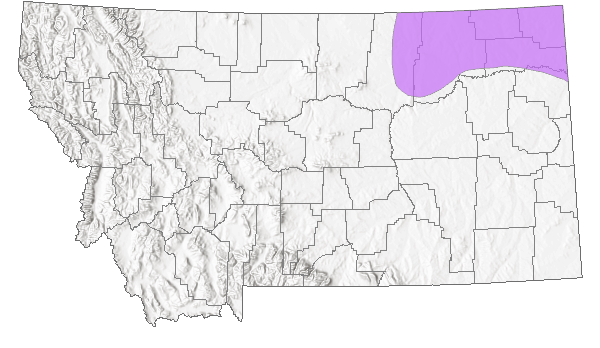
 Native
Native
Range Comments
BC east to QC and NB south to CA, AZ, KS, MO, dipping into AL, northwest to ME; Asia (Japan); Australia; Pacific Islands (New Zealand) (FNA 2002).
Observations in Montana Natural Heritage Program Database
Number of Observations: 4
(Click on the following maps and charts to see full sized version)
Map Help and Descriptions
Relative Density
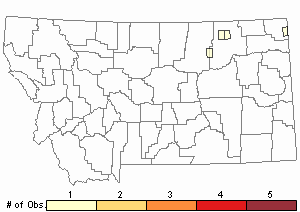
Recency
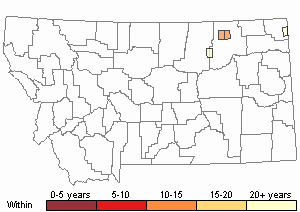
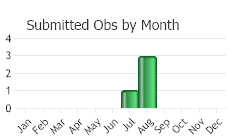
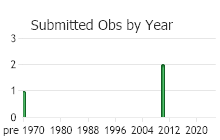 (Observations spanning multiple months or years are excluded from time charts)
(Observations spanning multiple months or years are excluded from time charts)
Habitat
Freshwater shores, coastal estuaries (FNA 2002), marshes and riparian communities (Welsh et al. 1993), occasionally up to a meter deep; tolerates alkaline conditions (Cronquist et al. 1977). Elevation: 3-6900 feet (FNA 2002).
National Vegetation Classification System Groups Associated with this Species
Wetland and Riparian
Riparian Shrubland
Wet Meadow and Marsh
Open Water
Open Water
Ecology
River Bulrush often forms dense clones in which all of the plants have been produced vegetatively and fruiting seldom occurs (Hitchcock et al. 1969).
Reproductive Characteristics
Spikelets and Spikelet Scales: Spikelets commonly 10-40 (Welsh et al. 1993), 10-25 mm in length, 6-10 mm in width (FNA 2002), some with sterile scale-like bracts at base (Welsh et al. 1993). Spikelet scales 7-10 by 3-4 mm, thin and translucent, frequently overlapping lightly (FNA 2002), tan or light brown, scarious, hirtellous on the back, the midrib excurrent as an awn, these usually 2-5 times longer than the apical notch of the scales and often recurved (Welsh et al. 1993).
Flowers and Fruit: Perianth bristles 6, retrorsely barbed, often equaling the achene (Welsh et al. 1993), but variable (Douglas et al. 2001), deciduous; stamens 3; styles 3-branched (Lesica 2012). Achenes trigonous, 3.5-5 mm long, minutely cellular-reticulate (Welsh et al. 1993), grey to brown (Lesica 2012).
(Lesica's contribution adapted from
Lesica et al. 2012. Manual of Montana Vascular Plants. BRIT Press. Fort Worth, TX)
Stewardship Responsibility
Threats or Limiting Factors
STATE THREAT SCORE REASON
Threat impact not assigned because threats are not known (MTNHP Threat Assessment 2021).
References
- Literature Cited AboveLegend:
 View Online Publication
View Online Publication Britton, N. L. and A. B. Brown. 1913. An Illustrated Flora of the Northern United States, Canada, and the British Possessions. 2nd Edition in 3 Volumes. New York, NY: Charles Scribner's Sons. B13BRI01PAUS.
Britton, N. L. and A. B. Brown. 1913. An Illustrated Flora of the Northern United States, Canada, and the British Possessions. 2nd Edition in 3 Volumes. New York, NY: Charles Scribner's Sons. B13BRI01PAUS. Cronquist, A., A. H. Holmgren, N. H. Holmgren, J. L. Reveal, and P. K. Holmgren. 1977. Intermountain flora: Vascular Plants of the Intermountain West, U.S.A. Volume 6: The Monocotyledons. New York, NY: Columbia University Press. 584 pp.
Cronquist, A., A. H. Holmgren, N. H. Holmgren, J. L. Reveal, and P. K. Holmgren. 1977. Intermountain flora: Vascular Plants of the Intermountain West, U.S.A. Volume 6: The Monocotyledons. New York, NY: Columbia University Press. 584 pp. Flora of North America Editorial Committee, eds. 2002. Flora of North America North of Mexico. Volume 23. Magnoliophyta: Commelinidae (in part): Cyperaceae. Oxford University Press, Inc., NY. xxiv + 608 pp.
Flora of North America Editorial Committee, eds. 2002. Flora of North America North of Mexico. Volume 23. Magnoliophyta: Commelinidae (in part): Cyperaceae. Oxford University Press, Inc., NY. xxiv + 608 pp. Hitchcock, C. L., A. Cronquist, M. Ownbey, and J. W. Thompson. 1969. Vascular Plants of the Pacific Northwest. Part I: Vascular Cryptogams, Gymnosperms and Monocotyledons. Seattle, WA: University of Washington Press. 914 pp.
Hitchcock, C. L., A. Cronquist, M. Ownbey, and J. W. Thompson. 1969. Vascular Plants of the Pacific Northwest. Part I: Vascular Cryptogams, Gymnosperms and Monocotyledons. Seattle, WA: University of Washington Press. 914 pp. Lesica, P., M.T. Lavin, and P.F. Stickney. 2012. Manual of Montana Vascular Plants. Fort Worth, TX: BRIT Press. viii + 771 p.
Lesica, P., M.T. Lavin, and P.F. Stickney. 2012. Manual of Montana Vascular Plants. Fort Worth, TX: BRIT Press. viii + 771 p. MTNHP Threat Assessment. 2021. State Threat Score Assignment and Assessment of Reported Threats from 2006 to 2021 for State-listed Vascular Plants. Botany Program, Montana Natural Heritage Program, Helena, Montana.
MTNHP Threat Assessment. 2021. State Threat Score Assignment and Assessment of Reported Threats from 2006 to 2021 for State-listed Vascular Plants. Botany Program, Montana Natural Heritage Program, Helena, Montana. Welsh, S.L, N.D. Atwood, S. Goodrich, and L.C. Higgins. 1993. A Utah Flora. 2nd edition, revised. Provo, UT: Brigham Young University. 986 p.
Welsh, S.L, N.D. Atwood, S. Goodrich, and L.C. Higgins. 1993. A Utah Flora. 2nd edition, revised. Provo, UT: Brigham Young University. 986 p.
- Additional ReferencesLegend:
 View Online Publication
View Online Publication
Do you know of a citation we're missing? Douglas, G.W., D. Meidinger, and J. Pojar, editors. 2001. The Illustrated Flora of British Columbia. Volume 6. Monocotyledons (Acoraceae through Najadaceae). British Columbia Ministry of Environment, Lands and Parks and British Columbia Ministry of Forests, Victoria.
Douglas, G.W., D. Meidinger, and J. Pojar, editors. 2001. The Illustrated Flora of British Columbia. Volume 6. Monocotyledons (Acoraceae through Najadaceae). British Columbia Ministry of Environment, Lands and Parks and British Columbia Ministry of Forests, Victoria. Lesica, P., M.T. Lavin, and P.F. Stickney. 2022. Manual of Montana Vascular Plants, Second Edition. Fort Worth, TX: BRIT Press. viii + 779 p.
Lesica, P., M.T. Lavin, and P.F. Stickney. 2022. Manual of Montana Vascular Plants, Second Edition. Fort Worth, TX: BRIT Press. viii + 779 p.
- Web Search Engines for Articles on "River Bulrush"





